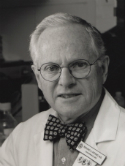Histone deacetylase inhibitors as new cancer drugs Journal Article
| Authors: | Marks, P. A.; Richon, V. M.; Breslow, R.; Rifkind, R. A. |
| Article Title: | Histone deacetylase inhibitors as new cancer drugs |
| Abstract: | Histone deacetylase inhibitors are potent inducers of growth arrest, differentiation, or apoptotic cell death in a variety of transformed cells in culture and in tumor bearing animals. Histone deacetylases and the family of histone acetyl transferases are involved in determining the acetylation of histones, which play a role in regulation of gene expression. Radiograph crystallographic studies reveal that the histone deacetylase inhibitors, suberoylanilide hydroxamic acid and trichostatin A, fit into the catalytic site of histone deacetylase, which has a tubular structure with a zinc atom at its base. The hydroxamic acid moiety of the inhibitor binds to the zinc. Histone deacetylase inhibitors cause acetylated histones to accumulate in both tumor and peripheral circulating mononuclear cells. Accumulation of acetylated histones has been used as a marker of the biologic activity of the agents. Hydroxamic acid-based histone deacetylase inhibitors limit tumor cell growth in animals with little or no toxicity. These compounds act selectively on genes, altering the transcription of only approximately 2% of expressed genes in cultured tumor cells. A number of proteins other than histones are substrates for histone deacetylases. The role that these other targets play in histone deacetylase inducement of cell growth arrest, differentiation, or apoptotic cell death is not known. This review summarizes the characteristics of a variety of inhibitors of histone deacetylases and their effects on transformed cells in culture and tumor growth in animal models. Several structurally different histone deacetylase inhibitors are in phase I or II clinical trials in patients with cancers. © 2001 Lippincott Williams & Wilkins, Inc. |
| Keywords: | unclassified drug; histone deacetylase inhibitor; review; cancer growth; neoplasms; animals; cell death; cell cycle; apoptosis; enzyme inhibition; gene expression; cell growth; tumor markers, biological; genetic transcription; cell differentiation; antineoplastic activity; tumor cells, cultured; gene expression regulation, neoplastic; mononuclear cell; enzyme inhibitors; cell transformation; vorinostat; disease models, animal; zinc; x ray crystallography; histones; histone deacetylases; trichostatin a; acetylation; mitosis inhibition; cancer; humans; human; priority journal |
| Journal Title: | Current Opinion in Oncology |
| Volume: | 13 |
| Issue: | 6 |
| ISSN: | 1040-8746 |
| Publisher: | Lippincott Williams & Wilkins |
| Date Published: | 2001-11-01 |
| Start Page: | 477 |
| End Page: | 483 |
| Language: | English |
| DOI: | 10.1097/00001622-200111000-00010 |
| PUBMED: | 11673688 |
| PROVIDER: | scopus |
| DOI/URL: | |
| Notes: | Export Date: 21 May 2015 -- Source: Scopus |
Altmetric
Citation Impact
BMJ Impact Analytics
Related MSK Work





